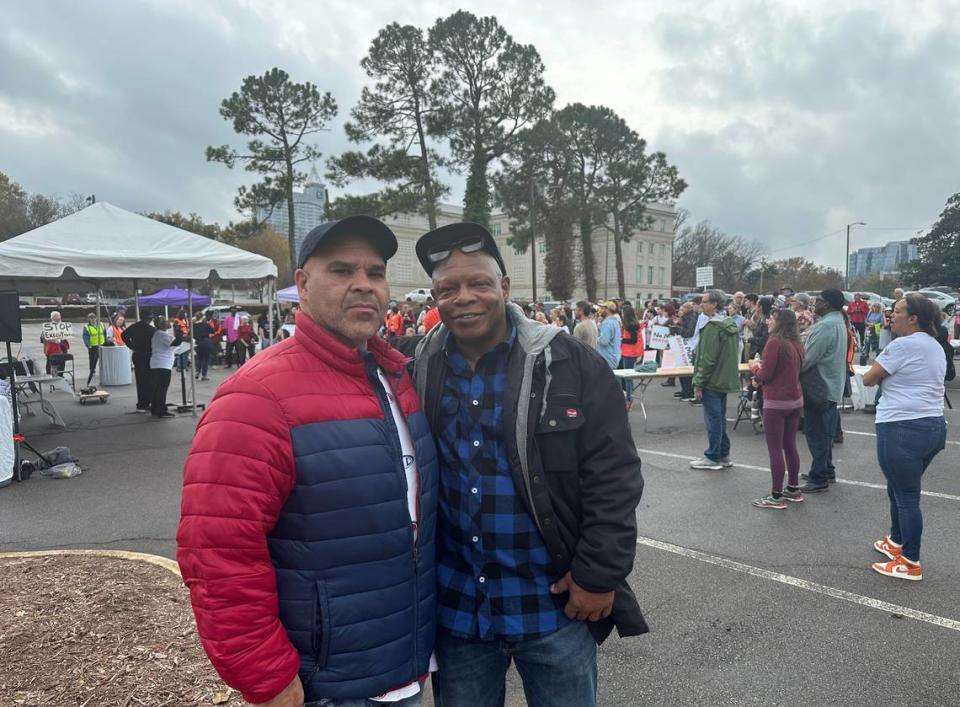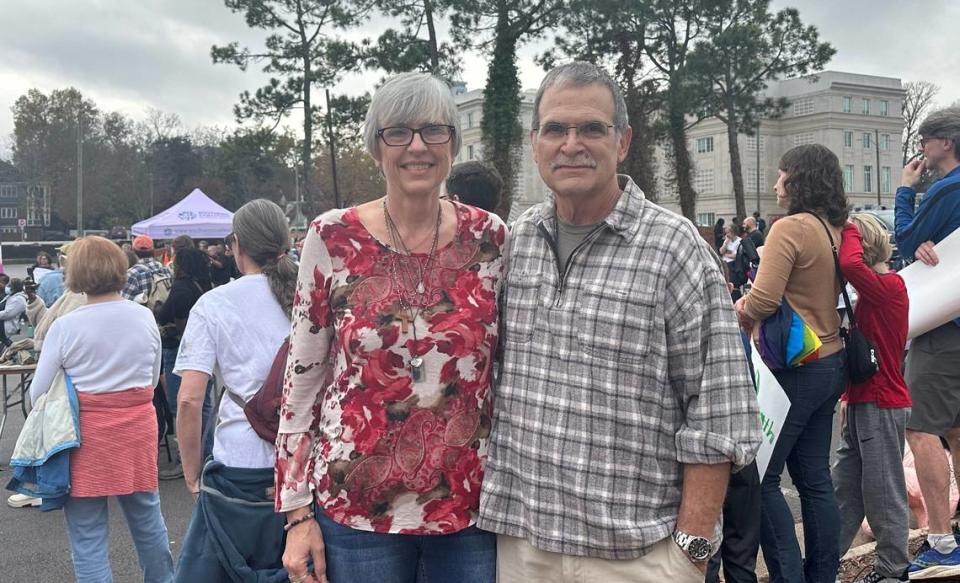‘Always room for error.’ Protesters urge NC governor to commute all death sentences
- Oops!Something went wrong.Please try again later.
More than 200 people marched outside the North Carolina governor’s mansion Saturday demanding Gov. Roy Cooper commute all the state’s death sentences to prison terms.
“Governor Cooper, we won’t go, free the row,” they shouted energetically, despite the gloomy weather.
This was not the first march of its kind. Last December, the N.C. Coalition for Alternatives to the Death Penalty and other advocates called on Cooper, a Democrat, to use his clemency power as governor to commute death sentences.
Shortly after that march and others hosted by civil rights groups, Cooper commuted the sentences of six people in state prisons and issued pardons to four others who had been convicted decades earlier. Two of those were through the Juvenile Sentence Review Board, created by Cooper in 2021 to review juvenile sentences of life without parole.
“We want to communicate very clearly to Governor Cooper that now is the time for him to give serious attention to this call for him to commute all the death sentences to prison terms, to leave a legacy when he leaves office that is even advancing racial justice and racial equity more than he has already done,” Noel Nickle, executive director of the NCCADP, told The News & Observer.
Beyond commutations, the coalition called for abolishing the death penalty and for criminal justice reform, citing racial disparities in charges.
Nickle said the coalition launched its commutation campaign focused on Cooper almost exactly a year ago. Since then, she said, she has been “very encouraged” with progress, pointing to the recent commutations.
Some marchers brought lived experience
Saturday’s gathering included North Carolinians who had family and loved ones on death row, as well as two men — Glen Edward Chapman and Alfred Rivera — exonerated after being on death row themselves.

Chapman spent 15 years on death row before being exonerated in 2008, having been found innocent of two murders he had been accused of committing. He was granted a new trial in 2007 after a judge found the state withheld evidence and because his defense attorneys were ineffective, according to the University of Michigan’s National Registry of Exonerations.
Rivera was imprisoned in 1996 after being convicted of two counts of murder. He was found innocent in 1999 after a new trial was ordered for wrongly excluded witness testimony.
“There’s always room for error,” said Chapman. “The only solution is to do away with it... Let’s move forward, stop staying in the old days.”
He spoke of the trauma his wrongful conviction caused.
“My sons were one and four when I went into prison,” he said. “Their mother passed away while I was in prison — the love of my life. I can’t get that back.”
A total of 73 people have been exonerated for wrongful convictions in North Carolina since 1989, according to the National Registry of Exonerations. Of those exonerated, 56 were Black.
A couple, Lynda Simmons and John Simmons, called for compassion despite having lost their 24-year-old son in 2004 after he was killed by an 18-year-old in a random act of violence.

Their son’s death led them to advocacy and to restorative justice, an approach that seeks alternatives beyond punishment, they said.
The person who killed their son served 15 years in prison.
“I’m grateful that (the death penalty) was not on the table because I would have opposed it,” said Lynda Simmons. “I don’t want to ever be complicit in anything that puts another mother through what I’ve been through, the loss of my son or anybody to have to experience that kind of pain. It’s just, it’s inhumane.”
History of the death penalty
North Carolina is one of 27 states that still retains the death penalty. There is also a death penalty for people convicted in federal courts across the country.
The death penalty in America dates back to the colonial period. But all those currently awaiting execution in the state were convicted and sentenced under the state’s revised capital punishment law that went effect in 1977. That law restored the death sentence for first-degree murder following a court ruling that had paused the practice.
In 2009, the state’s Democratically controlled General Assembly enacted the Racial Justice Act, which allowed inmates to challenge their death sentences on racial grounds. In 2013, under Republican Gov. Pat McCrory, the law was repealed.
According to a January 2023 report by the Capital Punishment Project of the Legal Defense Fund, a nonprofit focusing on racial justice, North Carolina had the fifth most prisoners on death row in the nation and had the eighth highest percentage of minorities on death row.

